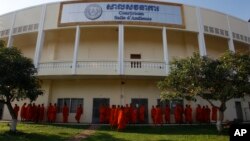Interior Minister Sar Kheng has said there were “no more suspects” to be tried for Khmer Rouge atrocities following the sentencing of two former regime leaders last week for genocide.
Nuon Chea, 92, the vice-secretary of the Communist Party of Kampuchea, and Khieu Samphan, 87, the head of state during the Democratic Kampuchea regime, were sentenced to life imprisonment at the conclusion of their trial in Case 002/02 last week. The pair were also sentenced to life in Case 002/01 in 2014.
On Saturday, Kheng said Cambodia had agreed to only investigate crimes by the most senior Khmer Rouge leaders, which meant the work of the Khmer Rouge tribunal was “all complete”.
“There are no more suspects to be brought to trial according to policy and principle; we only focus on the top leaders and those most responsible,” he said.
The tribunal has already begun proceedings in cases 003 and 004, despite strong objections from Prime Minister Hun Sen, a former Khmer Rouge commander, and other officials.
Neth Pheaktra, a court spokesman, declined to comment on the statement.
“Case 003 and 004 are in the hands of the investigative judges who are analyzing the evidence to reach a resolution. Please be informed that case 003 could be announced as early as the fourth quarter this year. And for case 004, it involves suspects O An, Yim Tith, and Im Chaem.”
Hun Sen has previously called for the tribunal to be closed if it attempts to prosecute more cases.
The Extraordinary Chambers in the Courts of Cambodia, as the tribunal is formally called, were established in cooperation with the United Nations, in 2006, with the aim of seeking justice for the crimes of the Khmer Rouge regime, which ruled Cambodia between 1975 and 1979.
Simon Walker, a representative of the UN High Commissioner for Human Rights, said in an email that the UN would continue to support the court.
“The judges will make any decision on the continuation of the pending cases, acting independently and impartially, on the basis of the facts and without undue or improper influence or pressure.”
Between 2006 and 2017 the court has spent almost $300 million to prosecute three individuals for Khmer Rouge crimes.







